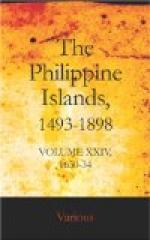What then would this holy provincial do? One sees with how much care he would watch over his flock, striving to maintain them without quarreling, and observing in everything the entirety of the rules. With the obstinate, he was rigid and severe; with the humble, most humble; with the afflicted, he held himself as a pious father who desires their good, and consoled them. As far as was possible, he followed the advice of Fray Pedro de Agurto, his successor in the bishopric, as he was so holy and learned a man. For since the affairs of the province had somewhat declined, and in visiting he found some religious who were prohibited by the rules—and, in fact, trying to remove them—the holy prelate counseled him that such religious were men of weight, and that he should receive their renunciations secretly; and that when the intermediate chapter should be assembled, then he should show them and provide those convents. Thereby would he be fulfilling his obligation, and would also be considering the honor of those religious, who if they were removed before, would be injured, as it would be understood that it had been because of their demerits; but it was a customary thing to do that in chapter, for it was apparent to all that religious were changed at that time. He did this as the bishop had counseled him, and thus the matter was remedied as far as possible without any scandal.
He visited the entire province, and went to that of the Pintados—which was his own, where he was reared, and where he had been prior of Panay, Octong, and Santisimo Nombre de Jesus. While he was making the visitation there, it happened that news was brought that the inhabitants of Mindanao were coming with a large fleet to destroy the islands. This tidings was certain; and another fleet was prepared with all possible despatch in Sugbu, in order that




